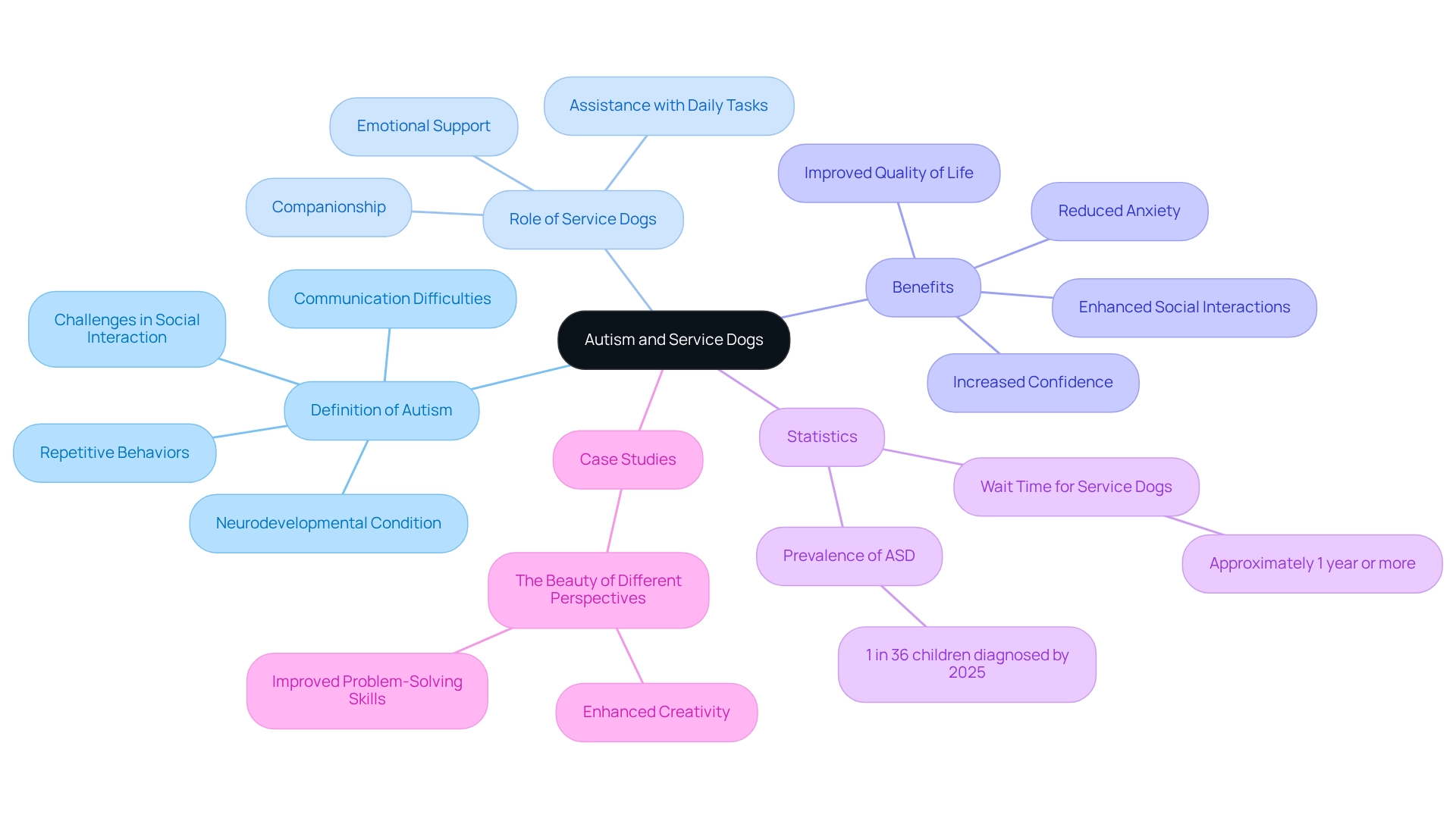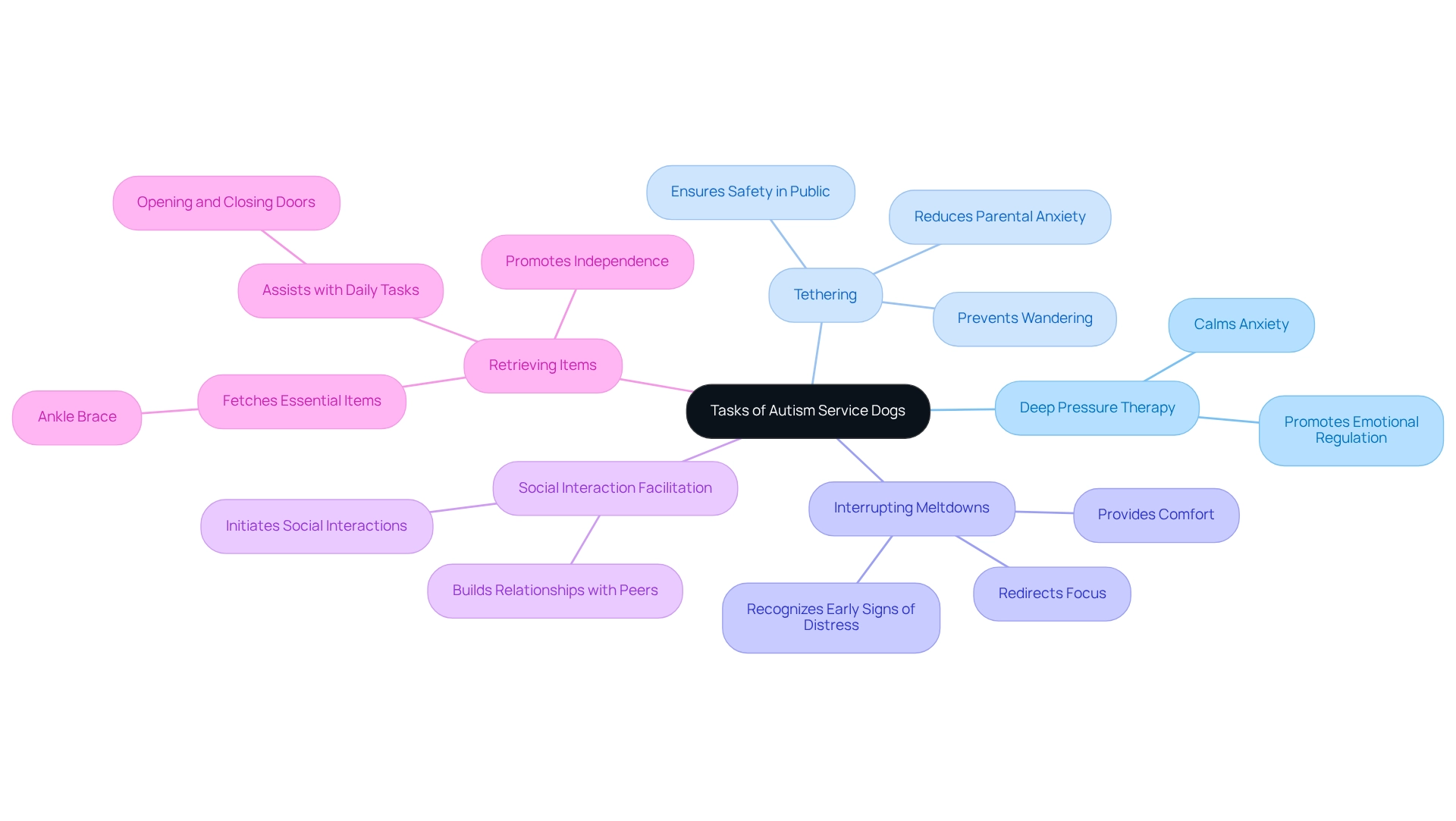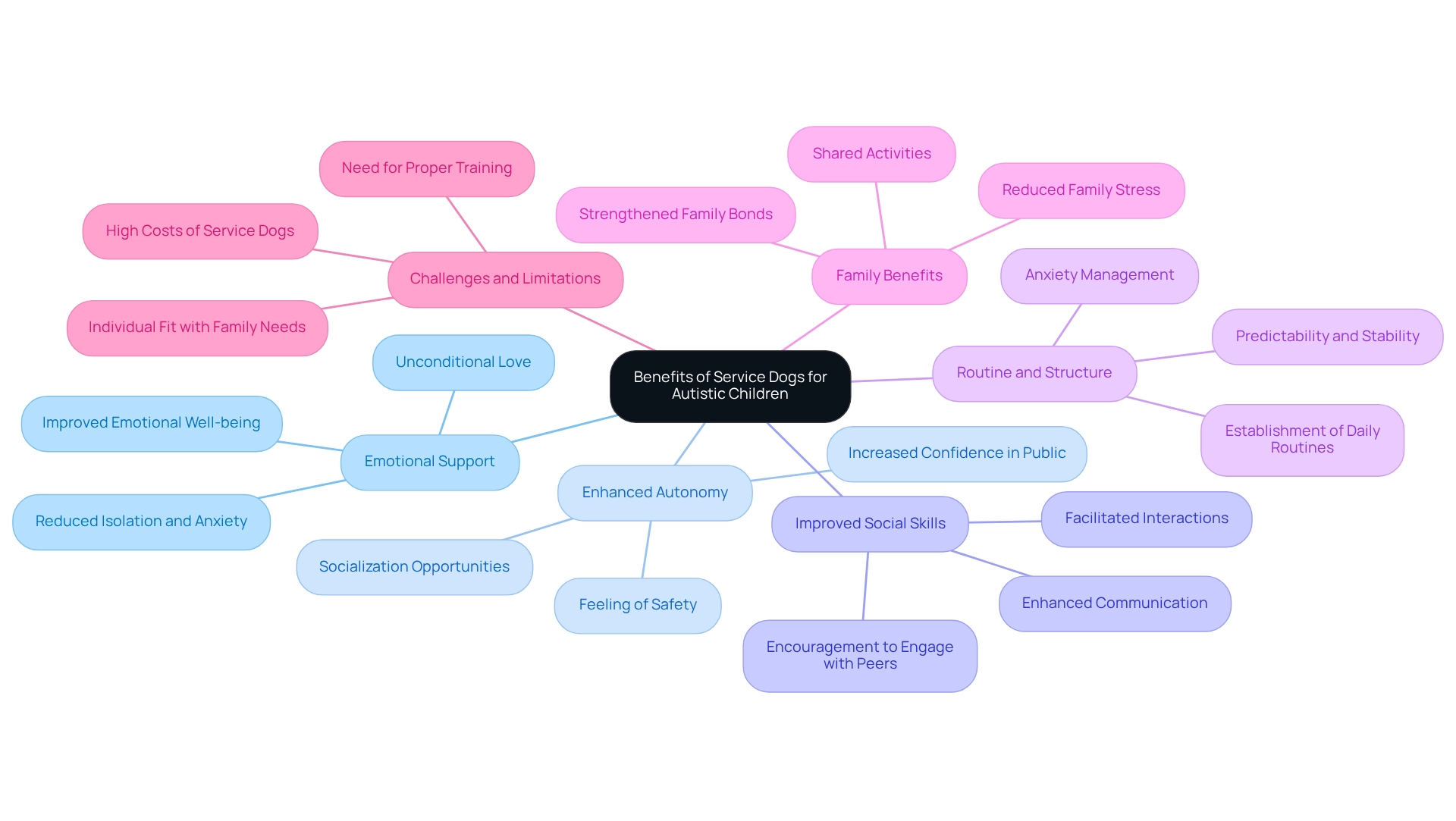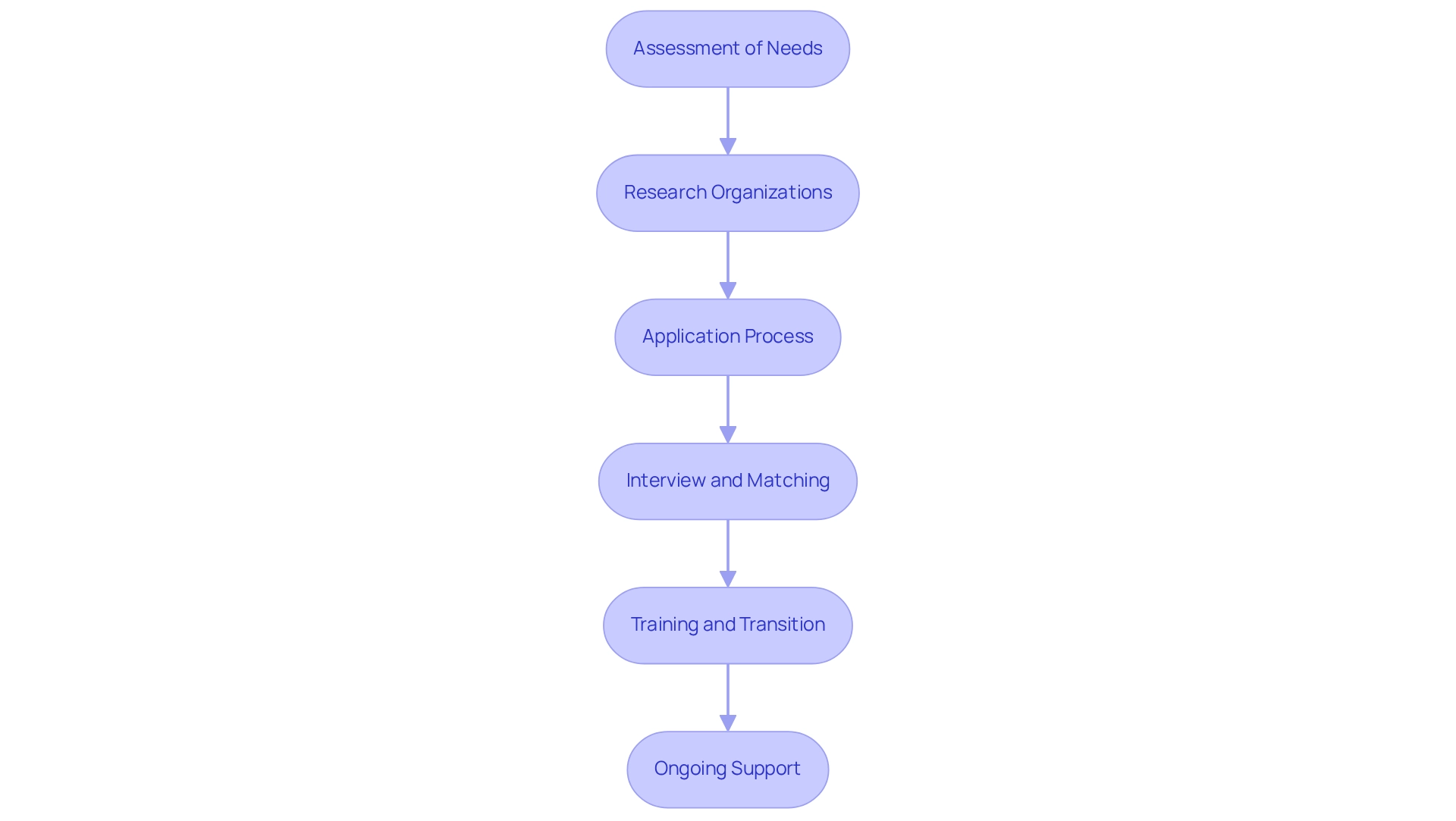Overview
Service dogs for autism offer profound benefits, providing emotional support, enhancing social skills, and assisting with daily tasks. These invaluable companions play a crucial role in improving the quality of life for individuals with Autism Spectrum Disorder (ASD). Imagine the comfort of knowing that a specially trained dog can help reduce anxiety, encourage social interactions, and promote independence. This support is vital for both children and adults as they navigate the unique challenges of autism. The bond formed with these dogs can truly transform lives.
Introduction
In the intricate landscape of Autism Spectrum Disorder (ASD), where challenges in communication and social interaction are prevalent, the role of service dogs shines as a beacon of hope and support. These specially trained companions not only provide emotional comfort but also enhance the quality of life for individuals with autism. They facilitate social interactions and promote independence, making a significant difference in everyday life.
As the prevalence of autism continues to rise, with alarming statistics indicating that approximately 1 in 36 children are diagnosed, the integration of service dogs into therapeutic strategies becomes increasingly vital. Imagine the joy of a child who feels understood and supported by their loyal companion, allowing them to navigate social situations with greater ease.
This article delves into the profound benefits these faithful friends offer, the specialized training they undergo, and the essential steps families must take to acquire an autism service dog. By illuminating the transformative impact these animals can have, we hope to inspire families to explore this supportive avenue for those navigating the challenges of autism.
Define Autism and the Role of Service Dogs
Autism, or Autism Spectrum Disorder (ASD), is a multifaceted neurodevelopmental condition that presents challenges in social interaction, communication, and repetitive behaviors. Many individuals with this condition also face sensory sensitivities, anxiety, and difficulties in navigating social situations. In this context, service dogs for autism emerge as invaluable companions, offering not only companionship but also emotional support and assistance with daily tasks. These specially trained animals can significantly reduce anxiety, enhance social interactions, and offer a sense of safety, making them essential allies for both children and adults with developmental disorders.
The benefits of a service dog for autism extend well beyond companionship; they can profoundly enhance the quality of life for individuals with autism. Numerous autistic individuals share experiences of improved social skills and increased confidence when accompanied by a service dog for autism. This is particularly evident in real-life scenarios where these animals encourage interactions within social settings, helping their handlers connect more comfortably with peers.
Statistics reveal a concerning trend: the prevalence of developmental disorders in children continues to rise, with recent estimates suggesting that approximately 1 in 36 children will be diagnosed with ASD by 2025. This increasing number underscores the critical need for effective support systems, including the integration of service dog autism into therapeutic practices. Experts caution that while the decision to acquire a service dog for autism should be made thoughtfully, the potential benefits for individuals with autism are substantial. As one expert noted, "You can anticipate a wait of about one year, probably more," highlighting the commitment required in the journey to secure an assistance dog.
Moreover, findings from the case study titled 'The Beauty of Different Perspectives' showcase the unique talents and experiences of autistic individuals, illustrating how assistance animals can bolster their creativity and problem-solving skills. In conclusion, service dogs autism hold a crucial place in the lives of individuals with autism, offering not only practical assistance but also emotional support that fosters improved social interactions and overall well-being.

Explore Training and Tasks of Autism Service Dogs
Service dogs for autism undergo extensive training to perform specialized tasks that significantly assist their handlers. These remarkable animals provide invaluable support in various ways, including:
- Deep Pressure Therapy: The dog applies gentle pressure to help calm the individual during moments of anxiety or sensory overload, promoting emotional regulation.
- Tethering: By being connected to the young one, the dog helps prevent wandering, ensuring safety in public spaces and reducing parental anxiety.
- Interrupting Meltdowns: Assistance animals can be trained to recognize early signs of distress and intervene by providing comfort or redirecting the young person's focus, effectively mitigating potential meltdowns.
- Social Interaction Facilitation: These animals play a crucial role in initiating social interactions, making it easier for autistic youngsters to engage with peers and build relationships.
- Retrieving Items: Service animals can fetch essential items, such as an ankle brace, and assist with daily tasks like opening and closing doors, promoting independence, which is vital for the individual's self-esteem and autonomy.
Research from the University of Arizona, in partnership with Canine Companions, emphasizes the transformative influence of service dogs for autism on children. For instance, Evan, who was matched with Service Dog Kalvin in June 2024, experienced a remarkable improvement in quality of life. Kalvin not only helped reduce Evan's sleep anxiety but also assisted with physical tasks, allowing him to conserve energy for daily activities. The family reported remarkable changes since receiving Kalvin at no cost, highlighting the significant advantages of these assistance animals.
As George Carlin humorously remarked, 'What do canines do on their day off? Can’t lie around — that’s their job!' Understanding these tasks is crucial for caregivers and specialists, as it demonstrates the important role that service dog autism can fulfill in improving the lives of autistic individuals. By joining a community focused on autism assistance, families can access valuable training resources and support, further empowering them in their journey.

Discuss Benefits of Service Dogs for Autistic Children
The benefits of having a service dog for autistic children are profound and multifaceted, offering a lifeline of support and companionship for families navigating the challenges of autism.
-
Emotional Support: Service dogs provide unconditional love and companionship, helping to reduce feelings of isolation and anxiety. Imagine the comfort of knowing that a loyal friend is always by your child's side. Research indicates that the presence of an assistance dog can lead to measurable improvements in emotional well-being, with many families reporting enhanced mood and reduced stress levels.
-
Enhanced Autonomy: With an assistance dog, youngsters can navigate public areas more confidently, knowing they have a trustworthy companion by their side. This heightened autonomy nurtures a feeling of safety, enabling young individuals to explore their surroundings more freely. Socialization involves exposing the dog to a variety of people, places, and situations, which is crucial for enhancing these interactions.
-
Improved Social Skills: Engaging with a therapy dog can act as a conduit for social exchanges, motivating youngsters to interact with peers and adults. Picture your child striking up a conversation with a new friend, all thanks to their furry companion. Research indicates that individuals with service dog autism frequently demonstrate enhanced social abilities, as the service dogs promote dialogue and interactions in diverse environments.
-
Routine and Structure: The presence of an assistance dog can help establish daily routines, providing a sense of predictability that is comforting for many autistic children. This structure can be particularly beneficial in managing anxiety and promoting a sense of stability in their lives.
-
Family Benefits: Service animals can also enhance family dynamics by reducing stress and fostering connections among family members, as they provide a shared focus and activity. Imagine the joy of a family outing made even more special by the presence of a beloved pet. This can strengthen relationships and create a more cohesive family unit.
These advantages highlight the significance of viewing a service dog for autism as a helpful resource for families facing the difficulties of autism. However, it is essential to collaborate with certified animal organizations to guarantee adequate training, as inadequately trained assistance animals can present risks. As developmental pediatrician Rolanda Maxim Gott states, "Whether you obtain a companion dog, assistance dog or therapy dog, choosing the appropriate animal involves discovering a highly individual 'match' – with the needs of the young one as well as the family."
Moreover, although assistance dogs provide numerous advantages, obstacles like the significant expenses related to acquiring and caring for a support dog can be restrictive for some families, hindering access to this essential intervention. Ultimately, choosing the appropriate assistance dog entails discovering a highly personal fit that corresponds with the young person's requirements and the family's way of life.

Outline the Process of Acquiring an Autism Service Dog
Acquiring a service dog autism can profoundly enhance a child's quality of life, and understanding the essential steps involved is crucial for families on this journey.
- Assessment of Needs: Begin by thoughtfully assessing your family's unique needs. Consider how a service dog autism can offer tailored assistance to address the specific challenges your child faces.
- Research Organizations: Take the time to research reputable organizations dedicated to training and placing assistance dogs for individuals with developmental disorders. It's important to consider factors such as training standards, costs, and average waiting times, which can vary from several months to over a year, depending on the organization.
- Application Process: Completing the application process is a vital step. This often involves submitting medical records that confirm your child's autism diagnosis and outlining the specific needs the assistance dog will fulfill, ensuring a clear understanding of your child's requirements.
- Interview and Matching: Many organizations conduct interviews to ensure a good match between families and suitable dogs. This process takes into account the dog's personality and the specific duties the assistance dog will perform, fostering a harmonious partnership.
- Training and Transition: Once a match is made, families typically engage in training sessions with the assistance dog. This training is essential for building effective teamwork and ensuring a smooth transition into daily life.
- Ongoing Support: After placement, it's important for families to seek ongoing support from the organization. This continuous assistance helps address any challenges that may arise and reinforces the training, enhancing the dog's effectiveness in supporting your child.
By following these steps, families can navigate the process of obtaining an assistance dog with confidence, ultimately enriching their child's emotional stability and social skills development. The presence of a service dog autism for individuals on the spectrum has been shown to stabilize a young person's mood during transitions or stressful situations, making them invaluable companions in managing their condition. Additionally, it's important to recognize that the family unit, including the parent, child, and service dog, has public access rights under the ADA, allowing them to navigate public spaces together. As L.C. Montalván wisely stated, "It’s challenging to be a support animal, just as it’s frequently difficult to be disabled … Please always honor assistance animals and the individuals who require them."
Moreover, case studies, such as 'Behavioral Support Provided by Service Dogs,' illustrate the profound ways these trained animals, in the context of service dog autism, assist young individuals with autism in various aspects of their daily lives, from therapy sessions to social interactions. For families contemplating this path, Rori Care – ABA Therapy offers consultations to explore how assistance animals can be integrated into your child's support framework.

Conclusion
Service dogs serve as a vital resource for individuals with Autism Spectrum Disorder (ASD), providing companionship and emotional support that greatly enhance their quality of life. These specially trained animals address the unique challenges faced by autistic individuals, such as anxiety, difficulties in social interaction, and the need for routine.
The training that service dogs undergo equips them to perform essential tasks, including deep pressure therapy and tethering. These actions can alleviate distress and ensure safety. Families often report significant improvements in emotional regulation and social skills when their children are paired with service dogs.
Acquiring an autism service dog involves several key steps:
- Assessing needs
- Researching reputable organizations
- Participating in a thorough matching process
This careful approach ensures that the service dog aligns with the child’s specific requirements, ultimately fostering greater independence and emotional stability.
In conclusion, integrating service dogs into the lives of individuals with autism is not just beneficial—it is essential. As awareness of their positive impact continues to grow, families are encouraged to consider this supportive option. By harnessing the unique bond between humans and dogs, we can create a more fulfilling life for those navigating the challenges of autism.
Frequently Asked Questions
What is Autism Spectrum Disorder (ASD)?
Autism Spectrum Disorder (ASD) is a multifaceted neurodevelopmental condition characterized by challenges in social interaction, communication, and repetitive behaviors. Individuals with ASD may also experience sensory sensitivities, anxiety, and difficulties in navigating social situations.
How do service dogs assist individuals with autism?
Service dogs for autism provide companionship, emotional support, and assistance with daily tasks. They can significantly reduce anxiety, enhance social interactions, and offer a sense of safety, making them essential allies for both children and adults with developmental disorders.
What are the benefits of having a service dog for autism?
The benefits of a service dog for autism include improved social skills, increased confidence, and enhanced quality of life. Many autistic individuals report better interactions in social settings when accompanied by a service dog.
What is the current prevalence of autism in children?
Recent estimates suggest that approximately 1 in 36 children will be diagnosed with Autism Spectrum Disorder (ASD) by 2025, indicating a concerning rise in the prevalence of developmental disorders.
What should be considered before acquiring a service dog for autism?
The decision to acquire a service dog for autism should be made thoughtfully, as it requires a significant commitment, including a potential wait time of about one year or more to secure an assistance dog.
How can service dogs enhance creativity and problem-solving skills in autistic individuals?
Findings from case studies, such as 'The Beauty of Different Perspectives,' illustrate that assistance animals can bolster the unique talents and experiences of autistic individuals, enhancing their creativity and problem-solving abilities.
What role do service dogs play in therapy for individuals with autism?
Service dogs hold a crucial place in the lives of individuals with autism, offering practical assistance and emotional support that fosters improved social interactions and overall well-being.




